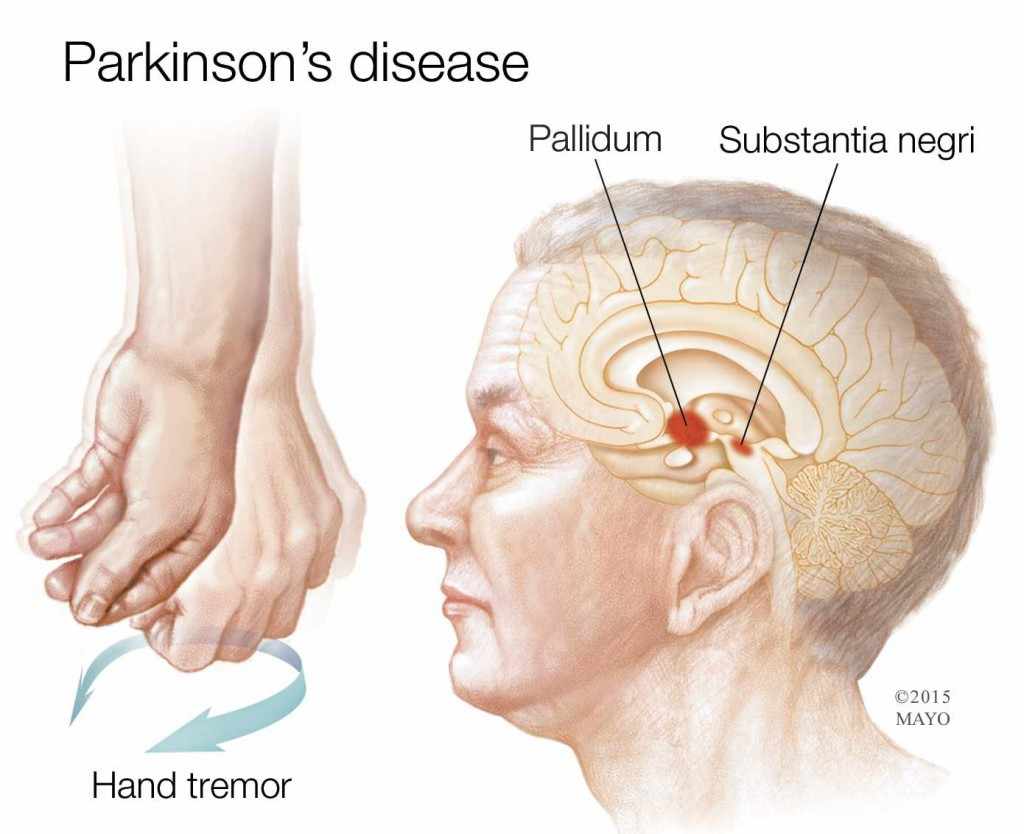-
What do you know about Parkinson’s disease?
 Parkinson's disease is a progressive disorder of the nervous system that affects movement. It develops gradually, sometimes starting with a barely noticeable tremor in just one hand. But while a tremor may be the most well-known sign of Parkinson's disease, the disorder also commonly causes stiffness or slowing of movement.
Parkinson's disease is a progressive disorder of the nervous system that affects movement. It develops gradually, sometimes starting with a barely noticeable tremor in just one hand. But while a tremor may be the most well-known sign of Parkinson's disease, the disorder also commonly causes stiffness or slowing of movement.
In the early stages of Parkinson's disease, your face may show little or no expression, or your arms may not swing when you walk. Your speech may become soft or slurred. Parkinson's disease symptoms worsen as your condition progresses over time.
Although Parkinson's disease can't be cured, medications may markedly improve your symptoms. In occasional cases, your doctor may suggest surgery to regulate certain regions of your brain and improve your symptoms.
Symptoms
Parkinson's disease symptoms and signs may vary from person to person. Early signs may be mild and may go unnoticed. Symptoms often begin on one side of your body and usually remain worse on that side, even after symptoms begin to affect both sides.
Parkinson's signs and symptoms may include:
- Tremor. A tremor, or shaking, usually begins in a limb, often your hand or fingers. You may notice a back-and-forth rubbing of your thumb and forefinger, known as a pill-rolling tremor. One characteristic of Parkinson's disease is a tremor of your hand when it is relaxed (at rest).
- Slowed movement (bradykinesia). Over time, Parkinson's disease may reduce your ability to move and slow your movement, making simple tasks difficult and time-consuming. Your steps may become shorter when you walk, or you may find it difficult to get out of a chair. Also, you may drag your feet as you try to walk, making it difficult to move.
- Rigid muscles. Muscle stiffness may occur in any part of your body. The stiff muscles can limit your range of motion and cause you pain.
- Impaired posture and balance. Your posture may become stooped, or you may have balance problems as a result of Parkinson's disease.
- Loss of automatic movements. In Parkinson's disease, you may have a decreased ability to perform unconscious movements, including blinking, smiling or swinging your arms when you walk.
- Speech changes. You may have speech problems as a result of Parkinson's disease. You may speak softly, quickly, slur or hesitate before talking. Your speech may be more of a monotone rather than with the usual inflections.
- Writing changes. It may become hard to write, and your writing may appear small.

When to see a health care provider
See your health care provider if you have any of the symptoms associated with Parkinson's disease — not only to diagnose your condition but also to rule out other causes for your symptoms.
Causes
In Parkinson's disease, certain nerve cells (neurons) in the brain gradually break down or die. Many of the symptoms are due to a loss of neurons that produce a chemical messenger in your brain called dopamine. When dopamine levels decrease, it causes abnormal brain activity, leading to signs of Parkinson's disease.
The cause of Parkinson's disease is unknown, but several factors appear to play a role, including:
- Your genes. Researchers have identified specific genetic mutations that can cause Parkinson's disease, but these are uncommon except in rare cases with many family members affected by Parkinson's disease.However, certain gene variations appear to increase the risk of Parkinson's disease but with a relatively small risk of Parkinson's disease for each of these genetic markers.
- Environmental triggers. Exposure to certain toxins or environmental factors may increase the risk of later Parkinson's disease, but the risk is relatively small.
Researchers have also noted that many changes occur in the brains of people with Parkinson's disease, although it's not clear why these changes occur. These changes include:
- The presence of Lewy bodies. Clumps of specific substances within brain cells are microscopic markers of Parkinson's disease. These are called Lewy bodies, and researchers believe these Lewy bodies hold an important clue to the cause of Parkinson's disease.
- Alpha-synuclein is found within Lewy bodies. Although many substances are found within Lewy bodies, scientists believe an important one is the natural and widespread protein called alpha-synuclein (A-synuclein). It's found in all Lewy bodies in a clumped form that cells can't break down. This is currently an important focus among Parkinson's disease researchers.
Risk factors
Risk factors for Parkinson's disease include:
- Age. Young adults rarely experience Parkinson's disease. It ordinarily begins in middle or late life, and the risk increases with age. People usually develop the disease around age 60 or older.
- Heredity. Having a close relative with Parkinson's disease increases the chances that you'll develop the disease. However, your risks are still small unless you have many relatives in your family with Parkinson's disease.
- Sex. Men are more likely to develop Parkinson's disease than are women.
- Exposure to toxins. Ongoing exposure to herbicides and pesticides may put you at a slightly increased risk of Parkinson's disease.
Complications
Parkinson's disease is often accompanied by these additional problems, which may be treatable:
- Thinking difficulties. You may experience cognitive problems (dementia) and thinking difficulties, which usually occur in the later stages of Parkinson's disease. Such cognitive problems aren't very responsive to medications.
- Depression and emotional changes. People with Parkinson's disease may experience depression. Receiving treatment for depression can make it easier to handle the other challenges of Parkinson's disease.You may also experience other emotional changes, such as fear, anxiety or loss of motivation. Doctors may give you medications to treat these symptoms.
- Swallowing problems. You may develop difficulties with swallowing as your condition progresses. Saliva may accumulate in your mouth due to slowed swallowing, leading to drooling.
- Sleep problems and sleep disorders. People with Parkinson's disease often have sleep problems, including waking up frequently throughout the night, waking up early or falling asleep during the day.People may also experience rapid eye movement sleep behavior disorder, which involves acting out your dreams. Medications may help your sleep problems.
- Bladder problems. Parkinson's disease may cause bladder problems, including being unable to control urine or having difficulty urinating.
- Constipation. Many people with Parkinson's disease develop constipation, mainly due to a slower digestive tract.
You may also experience:
- Blood pressure changes. You may feel dizzy or lightheaded when you stand due to a sudden drop in blood pressure (orthostatic hypotension).
- Smell dysfunction. You may experience problems with your sense of smell. You may have difficulty identifying certain odors or the difference between odors.
- Fatigue. Many people with Parkinson's disease lose energy and experience fatigue, and the cause isn't always known.
- Pain. Many people with Parkinson's disease experience pain, either in specific areas of their bodies or throughout their bodies.
- Sexual dysfunction. Some people with Parkinson's disease notice a decrease in sexual desire or performance.
Prevention
Because the cause of Parkinson's is unknown, proven ways to prevent the disease also remain a mystery. However, some research has shown that caffeine — which is found in coffee, tea and cola — may reduce the risk of developing Parkinson's disease. Green tea also may reduce the risk of developing Parkinson's disease.
Some research has shown that regular aerobic exercise may reduce the risk of Parkinson's disease.
***************







